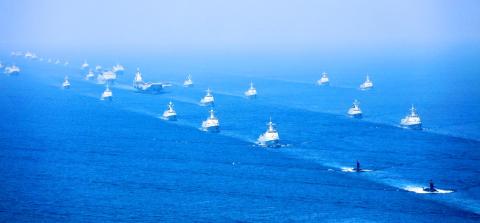Taiwan and Japan should confront China’s aggressive maritime patrols by making simulated attacks against the Chinese People’s Liberation Army Navy (PLAN) aircraft carrier Liaoning, retired US Navy admiral Dennis Blair said on Wednesday last week.
Blair, who served as national intelligence director under former US president Barrack Obama, made the remarks in an article discussing China’s maritime and air activity published on the Sasakawa Peace Foundation’s Web site, an organization he chairs.
In the article, Blair said that Taiwan and Japan’s practice of scrambling their forces to intercept and escort each Chinese air and maritime patrol, which he termed “intercept everything,” is wasteful and counterproductive.

Photo: Xinhua via AP
Such operations use up valuable flying time, strain limited budgets and achieve little in terms of military value, while creating a pattern of reactions that the PLA could exploit in war, he wrote.
Under the “intercept everything” policy, Taiwan and Japan are degrading the combat readiness of their forces to defend their territory and lowering their ability to deter Chinese military aggression, he added.
Taiwanese and Japanese forces should instead make their response selective, unpredictable and unrevealing of their full capabilities, while exercising their right under international law to occasionally patrol near Chinese territory and ignore Chinese protests, he wrote.
“Taiwanese forces should take advantage of [the PLAN carrier’s] presence to carry out simulated attacks against the Liaoning, raising their own readiness and demonstrating the reality that the Liaoning is vulnerable under wartime conditions,” he wrote, adding that Taiwanese and Japanese should understand that it is wartime capabilities, not peacetime operations, that deter potential aggressors from taking military action.
The two nations’ leaders should communicate to their respective citizens that ship and aircraft movement in peacetime do not reflect their ability under wartime conditions, he wrote.
The Liaoning — a refurbished Kuznetsov-class vessel and China’s sole aircraft carrier — has participated in 10 patrols and drills near Taiwan, four of which occurred this year, including a launch and recovery exercise in the Pacific.
When asked to comment, a Ministry of National Defense official said the military deems the shadowing of Chinese aircraft and ships by our forces a necessary policy for national security.
The military’s ground-based missile batteries, warships and fighters are well armed with Hsiung Feng and Harpoon anti-ship missiles, the source added.

CHAOS: Iranians took to the streets playing celebratory music after reports of Khamenei’s death on Saturday, while mourners also gathered in Tehran yesterday Iranian Supreme Leader Ayatollah Ali Khamenei was killed in a major attack on Iran launched by Israel and the US, throwing the future of the Islamic republic into doubt and raising the risk of regional instability. Iranian state television and the state-run IRNA news agency announced the 86-year-old’s death early yesterday. US President Donald Trump said it gave Iranians their “greatest chance” to “take back” their country. The announcements came after a joint US and Israeli aerial bombardment that targeted Iranian military and governmental sites. Trump said the “heavy and pinpoint bombing” would continue through the week or as long

TRUST: The KMT said it respected the US’ timing and considerations, and hoped it would continue to honor its commitments to helping Taiwan bolster its defenses and deterrence US President Donald Trump is delaying a multibillion-dollar arms sale to Taiwan to ensure his visit to Beijing is successful, a New York Times report said. The weapons sales package has stalled in the US Department of State, the report said, citing US officials it did not identify. The White House has told agencies not to push forward ahead of Trump’s meeting with Chinese President Xi Jinping (習近平), it said. The two last month held a phone call to discuss trade and geopolitical flashpoints ahead of the summit. Xi raised the Taiwan issue and urged the US to handle arms sales to

BIG SPENDERS: Foreign investors bought the most Taiwan equities since 2005, signaling confidence that an AI boom would continue to benefit chipmakers Taiwan Semiconductor Manufacturing Co’s (TSMC, 台積電) market capitalization swelled to US$2 trillion for the first time following a 4.25 percent rally in its American depositary receipts (ADR) overnight, putting the world’s biggest contract chipmaker sixth on the list of the world’s biggest companies by market capitalization, just behind Amazon.com Inc. The site CompaniesMarketcap.com ranked TSMC ahead of Saudi Aramco and Meta Platforms Inc. The Taiwanese company’s ADRs on Tuesday surged to US$385.75 on the New York Stock Exchange, as strong demand for artificial intelligence (AI) applications led to chip supply constraints and boost revenue growth to record-breaking levels. Each TSMC ADR represents

State-run CPC Corp, Taiwan (CPC, 台灣中油) yesterday said that it had confirmed on Saturday night with its liquefied natural gas (LNG) and crude oil suppliers that shipments are proceeding as scheduled and that domestic supplies remain unaffected. The CPC yesterday announced the gasoline and diesel prices will rise by NT$0.2 and NT$0.4 per liter, respectively, starting Monday, citing Middle East tensions and blizzards in the eastern United States. CPC also iterated it has been reducing the proportion of crude oil imports from the Middle East and diversifying its supply sources in the past few years in response to geopolitical risks, expanding